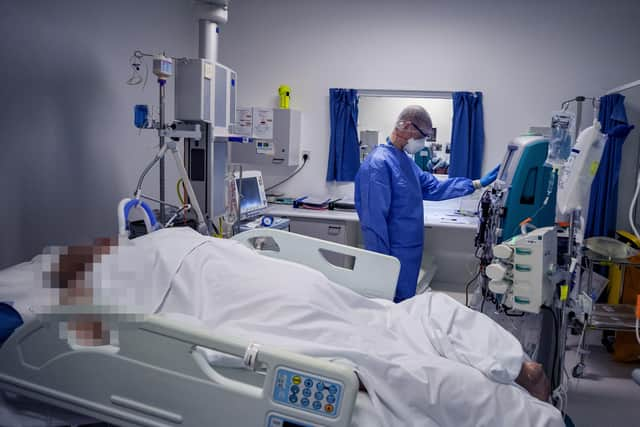Most NI care home residents now vaccinated - but ‘huge problem’ expected with Long Covid in 2021
and live on Freeview channel 276
Northern Ireland chair of the British Medical Association (BMA), Dr Tom Black was speaking after it was announced yesterday that NI had more than 1,600 new cases of coronavirus in the previous 48 hours, plus 20 deaths of people who had tested positive.
He said that while vaccines are being rolled out, the issue of “long covid” is going to be “a huge problem” in 2021.
Advertisement
Hide AdAdvertisement
Hide AdThe condition typically sees people suffering a wide range of debilitating symptoms after recovering from Covid, often including extreme fatigue.”Figures of more than 10% of patients with Covid are moving toward long covid,” he told Good Morning Ulster.


”Our experts are saying that the chance of a stroke or diabetes is hugely increased after Covid.”
People who have recovered will also be more susceptible to other many other diseases, he said, including respiratory conditions and heart disease.
”So once we get rid of covid we are going to have to be working on the long term side effects of Covid, so a busy year ahead in 2021.”
Advertisement
Hide AdAdvertisement
Hide AdHe said the expected approval of the AstraZeneca vaccine in the next few days for UK roll-out was very important.


“The Pfizer [vaccine] is good and we have vaccinated most of the residents of nursing homes,” he said.
The top priority right now is to reduce the death rate, he said, and the AstraZeneca vaccine would help achieve this.
The priority now is to ensure that the most at risk groups have been vaccinated - nursing home residents and staff and NHS staff.
Advertisement
Hide AdAdvertisement
Hide Ad”And the next priority is the over 80s because that is where most deaths come.”
AstraZeneca vaccine doses are already in storage in NI, just waiting for the green light from the UK regulator, he said.
“There are 82,000 people aged over 80 in Northern Ireland and we need to get them vaccinated this month”.
Most people in these target groups will be vaccinated in January which will reduce death rates, he said. However people will be called by their GP surgeries and should not contact them as this will only disrupt their workload, he added.
Advertisement
Hide AdAdvertisement
Hide AdDr Black said that 1600 new cases in NI over two days - 800 per day - was “a lot of cases”.
“That is more than the whole of the Republic of Ireland and the number of deaths we are having is still very high.
“It is very very difficult for the staff to keep all this going and we know that with the holiday period January is going to be very difficult - probably in about two weeks time.”
He is getting reports from doctors in Emergency Departments and GPs that they are “very busy but coping” but that there is “some evidence of services being stressed”.
Advertisement
Hide AdAdvertisement
Hide AdHe told Good Morning Ulster that the question of keeping schools open had been “the most difficult issue through the last year” but that the BMA had been “very clear” that it supports the opening of schools in order to maintain education and socialisation for children.
This was more important than keeping retail and hospitality open, he said; infection rates would have been much worse if those two sectors had been allowed to open freely in 2020 he said.
However due to current infection rates he accepted that it could “possibly” be too great a risk to reopen schools at the normal time in the new year.
”We rely on our chief medical officer and chief scientific advisor to look at the statistics,” he said.
Advertisement
Hide AdAdvertisement
Hide Ad“They will see the granular detail as the data comes through and they will be able to advise us in the next week. or so whether the schools can go back in time or whether they need to delay for a week or two.”
He added that there is no evidence that the new more infectious variant of Covid has appeared in NI yet, with the latest infection rates being “steady” in comparison to pre-Christmas.
In the south and south east of England, by contrast, there has been a marked spike in infection rates that is being put down to new variant, he added.
A message from the Editor:
Advertisement
Hide AdAdvertisement
Hide AdThank you for reading this story on our website. While I have your attention, I also have an important request to make of you.
With the coronavirus lockdown having a major impact on many of our advertisers - and consequently the revenue we receive - we are more reliant than ever on you taking out a digital subscription.
Subscribe to newsletter.co.uk and enjoy unlimited access to the best Northern Ireland and UK news and information online and on our app. With a digital subscription, you can read more than 5 articles, see fewer ads, enjoy faster load times, and get access to exclusive newsletters and content. Visit https://www.newsletter.co.uk/subscriptions now to sign up.
Our journalism costs money and we rely on advertising, print and digital revenues to help to support them. By supporting us, we are able to support you in providing trusted, fact-checked content for this website.
Alistair Bushe
Editor